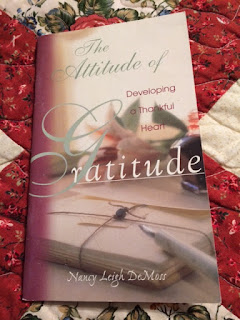People with grateful hearts are easily contented,
while ungrateful people are subject to bitterness and discontent.
Years of counseling with people who are chronically unhappy, depressed, frustrated, and emotionally unstable, have convinced me that these "disorders" often stem from an unthankful heart, regardless of any external circumstances that may appear to provide an explanation.
An ungrateful person holds tightly to his "rights," and sets himself up for hurt and disappointment when God or others fail to perform according to is expectations. But the individual who has yielded all his rights to God, sees all of life through thankful eyes, and has no room in his heart for selfish, destructive emotions.
Great saints of the past sing in unison on this point. A. W. Tozer observed,
Thanksgiving is a proper answer to dark disquieting thoughts, and may be an effectual means to silence them. Songs of praise are sovereign cordials to drooping souls, and will help to cure melancholy. When we have no other answer to the suggestions of grief and fear, we may have recourse to this, "I thank Thee, O Father."
John Henry Jowett put it this way:
"Gratitude is a vaccine, and antitoxin, and an antiseptic." Another preacher expanded the analogy:
Gratitude can be a vaccine that can prevent the invasion of a disgruntled attitude. As antitoxins prevent the disastrous effects of certain poison's and diseases, thanksgiving destroys the poison of faultfinding and grumbling. When trouble has smitten us, a spirit of thanksgiving is an soothing antiseptic.
Friedrich Ruckert said it succinctly: "Wouldst thou first pause to thank thy God for every pleasure, for mourning over griefs thou wouldst not find the leisure."




No comments:
Post a Comment
Hello~ I love getting your comments. I have made a few changes to make things a little easier for you and hoping a more enjoyable experience for both you and I. Have a blessed day! :o)